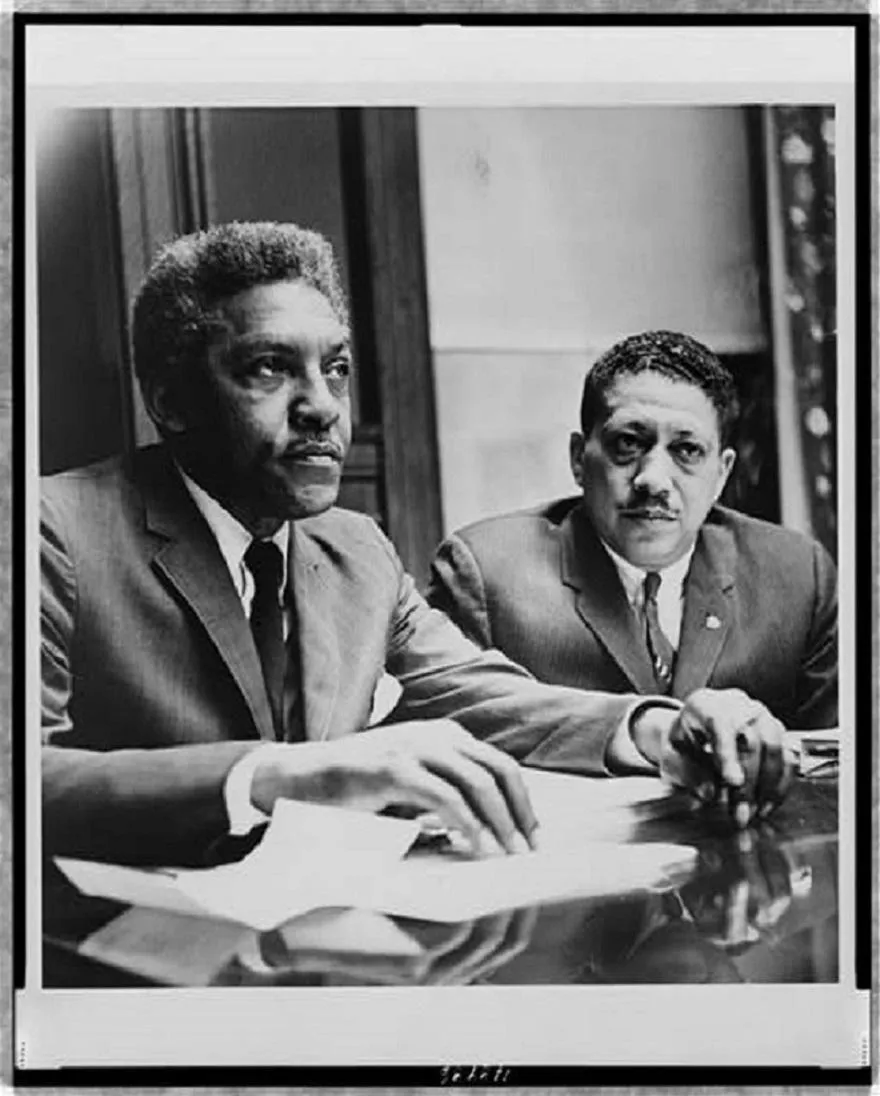 Bayard Rustin (left) and Dr. Eugene Reed at Freedom House / World Telegram & Sun photo by Al Ravenna.
Bayard Rustin (left) and Dr. Eugene Reed at Freedom House / World Telegram & Sun photo by Al Ravenna.
Born 17 March 1912 in Pennsylvania and raised by his Quaker grandparents, he was by nature a pacifist who sought to change America through nonviolent means. Influenced by his grandmother, he joined the National Association for the Advancement of Colored People which, along with his enrolment at the City College of New York, set him on a path to become an influential activist.
He met Martin Luther King Jr. during the Montgomery bus boycott in 1956, Rustin was a member of the Young Communist League and founder of the Congress of Racial Equality at the time. As a follower of Gandhi and his teachings of nonviolence, Rustin managed to persuade King to accept pacifism as a way of life. This combined with his strategic mind, led King to ask him to be his advisor. Most notably Rustin organised and led the March on Washington for Jobs and Freedom in 1963, a defining moment in the civil rights movement and the setting for King’s ‘I Have a Dream’ speech.
However, despite being one of the principal architects of the civil rights movement, Rustin faced hardships. In 1953, he was arrested for a homosexual act and as a result was forced to leave the Fellowship of Reconciliation. This led to public attacks on Rustin by some civil-rights leaders and political opponents who claimed he was ‘immoral’. In a rare recording of Rustin talking about the challenges he faced as a gay man, he divulged that in 1962 he was also asked to end his association with Martin Luther King Jr. by a committee set up by King. This followed on from rumors that he and King were romantically involved, a danger, the committee thought, to both King’s character and the goals of the movement.
Despite tensions, Rustin continued to engage unabated in the struggle for justice up until his death in 1987. He enthusiastically worked for racial equality and as the President of the A Phillip Randolph Institute, fought to improve the economic situations of African Americans. In 1968, he drafted the ‘Economic Bill of Rights’ to realise job security and increase living wage for minorities and poor people.
Prior to his death, he became more vocal about his sexuality and refocused his attention towards gay rights. In a 1987 interview with Village Voice he said, “I think the gay community has a moral obligation … to do whatever is possible to encourage more and more gays to come out of the closet.”
Bayard Rustin’s unflinching commitment to equality and nonviolence has created a legacy that can be found in his profound impact on Sir Martin Luther King Jr., the fight for the end of discrimination based on race and sexual orientation, and for economic justice. Although, left in the background for many years, his influence has become acknowledged overtime and in 2013 he was posthumously awarded the Presidential Medal of Freedom by former President Barack Obama.